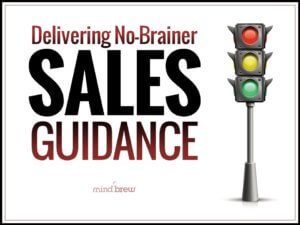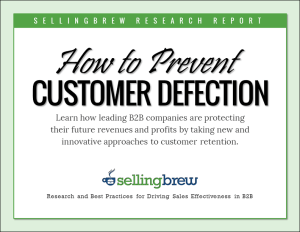Some sales managers will tell you that they believe in “management by result.” In other words, they don’t really care all that much which tactics their salespeople use as long as they are meeting their numbers.
This group of folks will often toss a brand new rep into a territory with very little guidance. They figure the new recruit will either sink or swim. And if they sink, they probably weren’t cut out for sales in the first place.
Aside from the harm that this approach can have on the careers of the individual salespeople involved, management by result can also have long-term negative consequences for the organization. Here’s why:
- It usually takes a couple of quarters before it becomes apparent that a new salesperson is doing more sinking than swimming.
- In that time, the new salesperson make have irreparably harmed relationships with existing customers, making it impossible to stave off defections.
- If the salesperson isn’t delivering agreed-on messaging, they may be harming your company’s reputation among prospects.
- If they aren’t following pricing guidance, they might be causing damage to the market that shrinks margins for years to come.
- When a new salesperson takes over the territory, they will face an uphill battle, which may lead to more lost sales and possibly employees quitting.
What’s particularly insidious about management by result is that sometimes it works. A few salespeople will be so gifted and experienced that they will manage to keep customers happy and even increase sales without a lot of guidance from management. These rare successes give bad managers just enough reinforcement to convince them that they are taking the right approach.
But the truth is that sales managers will likely be far more successful with a well-thought-out onboarding and training strategy.
Yes, some great salespeople are born, but most of them are made. And with the right leadership and guidance, you can get effective performance even from people who initially have a fairly mediocre skill level.
If you want to do a better job of leading your team, check out the following resources:
- More Effective Onboarding lays out a process for testing and improving your onboarding processes over time so that your sales team becomes more effective.
- Delivering No-Brainer Sales Guidance explains how to give your team the right data at the right time so that they make the right selling decisions.
- Rethinking Sales Coverage offers suggestions for assigning territories or coverage areas in ways that will maximize the effectiveness of each and every salesperson.
- Leading Edge Account and Territory Planning examines what leading-edge teams are doing to develop prescriptive account plans and grow their book of business.
For every new salesperson who “swims” when tossed out into the choppy waters of the marketplace, there are at least half a dozen who “sink.” And over time, these sinkings can be enough to cause your company to drown.
It’s good to hold your team accountable for their results. But instead of the hands-off management-by-results approach, give your team the support they need. Over time, that will yield a much higher proportion of “swimmers” and ultimately, greater success for your organization.














